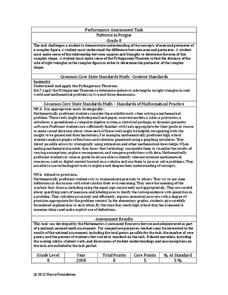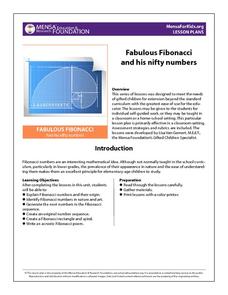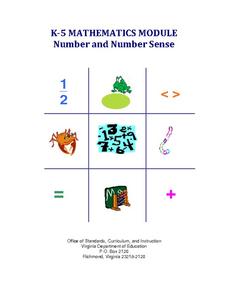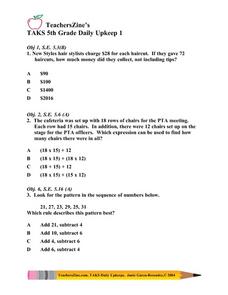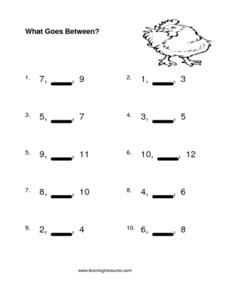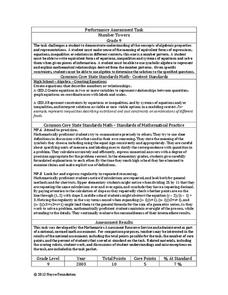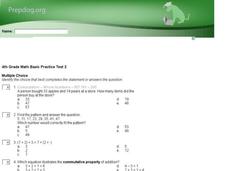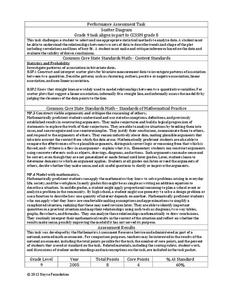Super Teacher Worksheets
Number Patterns
Pattern recognition is an essential step in the development of young mathematicians fluency with the four basic operations. This simple skills practice worksheet asks children identify and complete three different numerical patterns,...
Inside Mathematics
Patterns in Prague
Designers in Prague are not diagonally challenged. The mini-assessment provides a complex pattern made from blocks. Individuals use the pattern to find the area and perimeter of the design. To find the perimeter, they use the Pythagorean...
MENSA Education & Research Foundation
Fabulous Fibonacci and His Nifty Numbers
Fibonacci numbers are not only found in the classroom but also in nature. Explore the concept of Fibonacci numbers through a series of lessons designed to gain insight into the mathematical reasoning behind the number pattern, and spark...
Cabrillo College
Elementary Algebra
Hello Algebra! If you're in need of a resource with a books worth of examples and practice problems, this is it. Some topics include linear equations, polynomials and exponents, rational expressions, quadratic equations, and a great...
Curated OER
January Worksheets: Snowflake Patterning
In this lower elementary patterning worksheet, learners cut out four snowflake pictures along the dotted lines. They place each picture in the boxes above to complete the pattern.
Curated OER
K-5 Mathematics Module: Number and Number Sense
Reinforce number sense with a collection of math lessons for kindergarteners through fifth graders. Young mathematicians take part in hands-on activities, learning games, and complete skills-based worksheets to enhance proficiency in...
Noyce Foundation
Between the Lines
Explore linear and square dimensions by comparing areas of similar figures. A creative set of five activities designed for elementary through high school classes asks young scholars to compare areas of specific polygons. The first two...
Curated OER
My Foot and the Standard Foot
Young mathematicians put one foot in front of the other as they learn how to measure length in an elementary math lesson. Using paper cutouts of their own feet, children measure classroom objects as they discover the importance of...
Curated OER
Three Number Sequences Worksheets
Test your students' number line skills with these sequences, which they must finish and then indicate if they are ascending or descending. Numbers range from negative numbers to decimals. This activity would be a great teaching tool for...
Virginia Department of Education
Integers: Addition and Subtraction
Young mathematicians construct their own understanding of integers with an inquiry-based math lesson. Using colored chips to represent positive and negative numbers, children model a series of addition and subtraction problems as they...
Noyce Foundation
Tri-Triangles
Develop an understanding of algebraic sequences through an exploration of patterns. Five leveled problems target grade levels from elementary through high school. Each problem asks young mathematicians to recognize a geometric pattern....
Noyce Foundation
Miles of Tiles
Create number sentences and equations to solve geometric problems. Each activity in the series of five asks young mathematicians to consider different-sized tiles to build structures according to specific criteria. The first activities,...
Curated OER
Math worksheets for Kids
In this math learning exercise, there are lots of links for different types of math problems. There are patterns and counting, addition and subtraction. This site is geared towards elementary kids.
Curated OER
TAKS 5th Grade Daily Upkeep 1
In this elementary math worksheet, 5th graders find the answers to the word problems in the multiple choice format for addition and multiplication.
Curated OER
What Goes Between? Number Sequences
In this lower elementary math worksheet, students fill the blank in the middle of two numbers with the number that completes the sequences. They see 4,___.6; and fill in the blank. They see a black line picture of a chicken on the page.
Inside Mathematics
Number Towers
Number towers use addition or multiplication to ensure each level is equal. While this is common in factoring, it is often not used with algebraic equations. Solving these six questions relies on problem solving skills and being able to...
Curated OER
Online Interactive Math: Upper Elementary: Mixed Skills
In this online math worksheet, students complete a 20 problem multiple choice online interactive worksheet with mixed skills including geometry, rounding, and three digit multiplication.
Inside Mathematics
Squares and Circles
It's all about lines when going around. Pupils graph the relationship between the length of a side of a square and its perimeter. Class members explain the origin in context of the side length and perimeter. They compare the graph to the...
Curated OER
TAAS Attack Daily Upkeep 2 4th Grade
In this elementary math worksheet, 4th graders practice solving problems for reviewing the concepts of number sentences, numeration, and geometry.
Curated OER
TAKS 3rd Grade Daily Upkeep 8
In this elementary math worksheet, 4th graders practice solving the 4 problems focusing on the concepts of symmetry, number patterns, and number order.
Inside Mathematics
Scatter Diagram
It is positive that how one performs on the first test relates to their performance on the second test. The three-question assessment has class members read and analyze a scatter plot of test scores. They must determine whether...
Inside Mathematics
Magic Squares
Prompt scholars to complete a magic square using only variables. Then they can attempt to solve a numerical magic square using algebra.
Inside Mathematics
Two Solutions
Many problems in life have more than one possible solution, and the same is true for advanced mathematics. Scholars solve seven problems that all have at least two solutions. Then three higher-level thinking questions challenge them to...
Noyce Foundation
Boxes
Teach your class to think outside the box. Scholars use the concept of equality to solve a problem in the assessment task. They determine how to use a scale to identify the one box out of a set of nine boxes that is heavier than the others.



